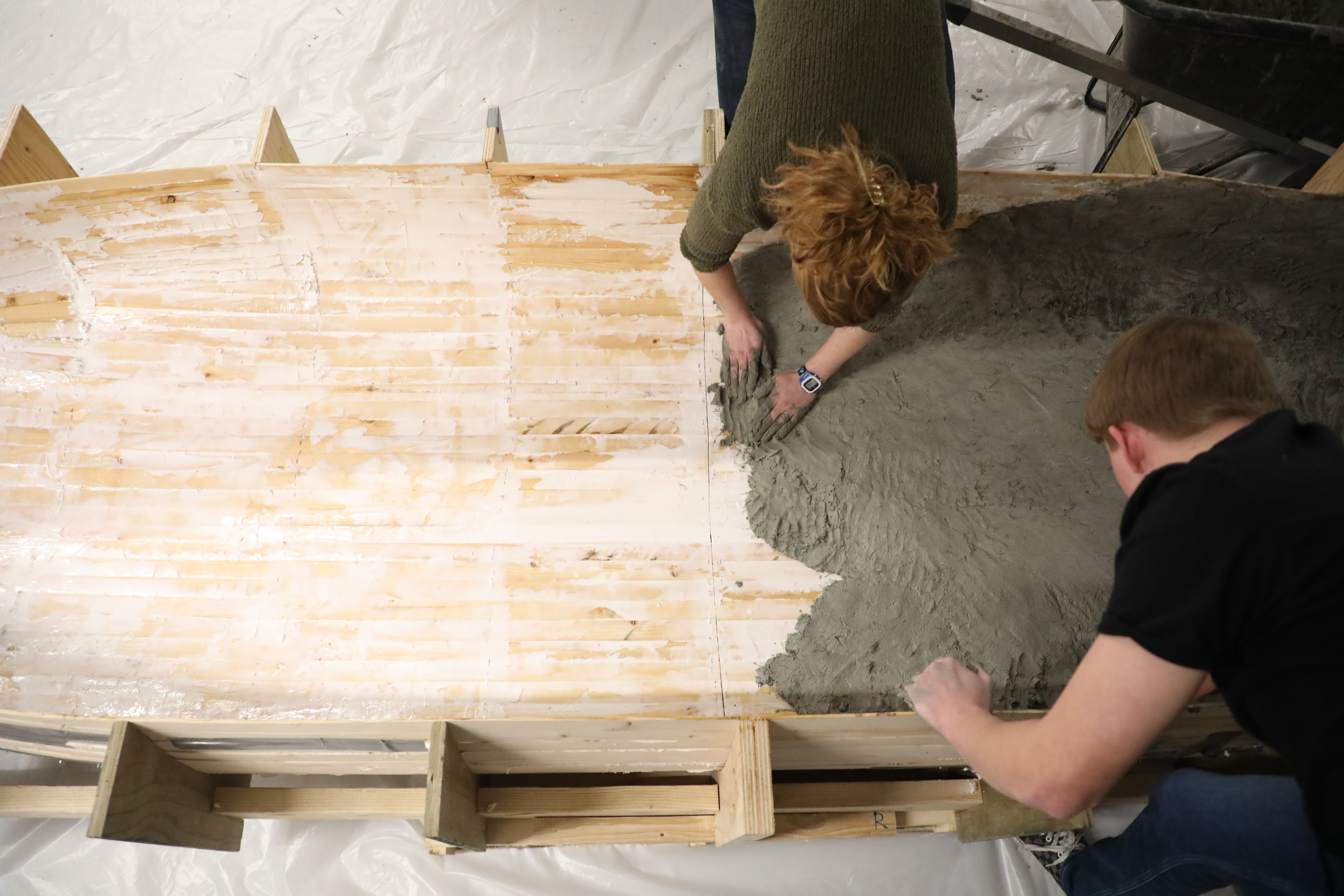Montana Tech ASCE Students Compete in Rocky Mountain Regional Concrete Canoe Competition

The Montana Tech American Society of Civil Engineers Chapter successfully raced a canoe made of concrete in the ASCE Rocky Mountain Regional Concrete Canoe Competition April 8-9, at the Colorado School of Mines, against other teams from the U.S..
The ASCE has challenged engineering students to design and race a canoe made of concrete since 1988. The competition is often referred to as America's Cup of Civil Engineering. Faculty advisor Bret Robertson noted this year’s Montana Tech team was comprised entirely of novice members who had never competed before.
"The Concrete Canoe competition was both fun and very challenging,” ASCE chapter secretary Avery Londo said. “You are tasked with creating a boat from a material that isn't optimal for floating... challenge accepted. This competition gives us a chance to use what we've learned in the classroom to engineer and build a cool project. We learned so much and got lots of practical, applicable experience that we couldn't have gotten in a classroom, all while having a blast and creating a great group of friends.”
The competition is judged on a technical report, overall canoe design, and performance during races. These challenges assess the creation of the team’s theme, design of the canoe and mixtures, and the finished product. Judges evaluate aesthetics, durability, and effectiveness of the canoe shape. One of the most important parts of testing is the swamp test. The swamp test is performed prior to racing when each team must submerge the canoe under water and show that it floats afterward. Once teams pass the swamp test, it’s time for the races, with both sprinting and slalom events.
The team met weekly from Labor Day until competition in April, and built their canoe mold out of wood, which is a less common choice amongst the competing teams than making a mold of foam, but does come with its own set of advantages. The team decided to compete in the Rocky Mountain Region this year, which made it so competitors could attend in-person, but also cut down the design time available by three weeks. The time crunch meant the team had to compete with their initial design. There was no time to make a back-up canoe that might float better.
“There were numerous hurdles throughout the designing and construction process of our canoe,” ASCE treasurer Mehana Benson said. “One particular hurdle being on concrete mix and pour day. Our concrete wizard advisor was unexpectedly out of town and our team had to work together to mix and pour concrete - something none of us had done before. This was a huge milestone for our team.”
The team began pouring concrete at 6 p.m. one evening and stayed in the lab until 1 a.m. to finish casting the canoe. At competition, the team didn’t place, but they are already meeting with plans for next year’s competition which will take place at the Spring 2023 Pacific Northwest ASCE symposium. Montana Tech will be co-hosting with Montana State University, Carroll College, and Montana State University-Northern.
“The Concrete Canoe competition was one of the most challenging yet fulfilling things I have done since becoming an engineer,” said Koby Martin. “It was an opportunity to culminate all of our interest in different aspects of engineering into a project that tested our critical thinking, problem solving, and ability to plan and see through a construction project to the end.”
Robertson said the ASCE chapter at Montana Tech has grown to 62 students this year, up from six in 2020. The 12 students who competed in Colorado included: structural design captain Koby Martin, rowing team captain Erik Casagranda, mix design captain Maria Burke, Jared Griffith, Avery Londo, Mehana Benson, Beau Drivdahl, Austin Gerry, Rilee Green, Rowdy Lamb, Carson Lipp, and Lance Morton. Several other students also aided in the design and build of the canoe.
ASCE Chapter President Jared Griffith said that this year’s competition is just the beginning for the team.
“Moving forward, I believe the most important part to having a successful chapter is to grow and get more students involved,” Griffith said. “This year, we have had many opportunities for students to participate in, but I know we will have even more next year. I can honestly say that becoming a member of our ASCE chapter has been the best decision I've made since coming to college and would recommend it to any other student. Being in ASCE, I have learned so much more than just engineering, and I hope our other members have as well.”
Students interested in joining ASCE can find out more by visiting www.mtech.edu.